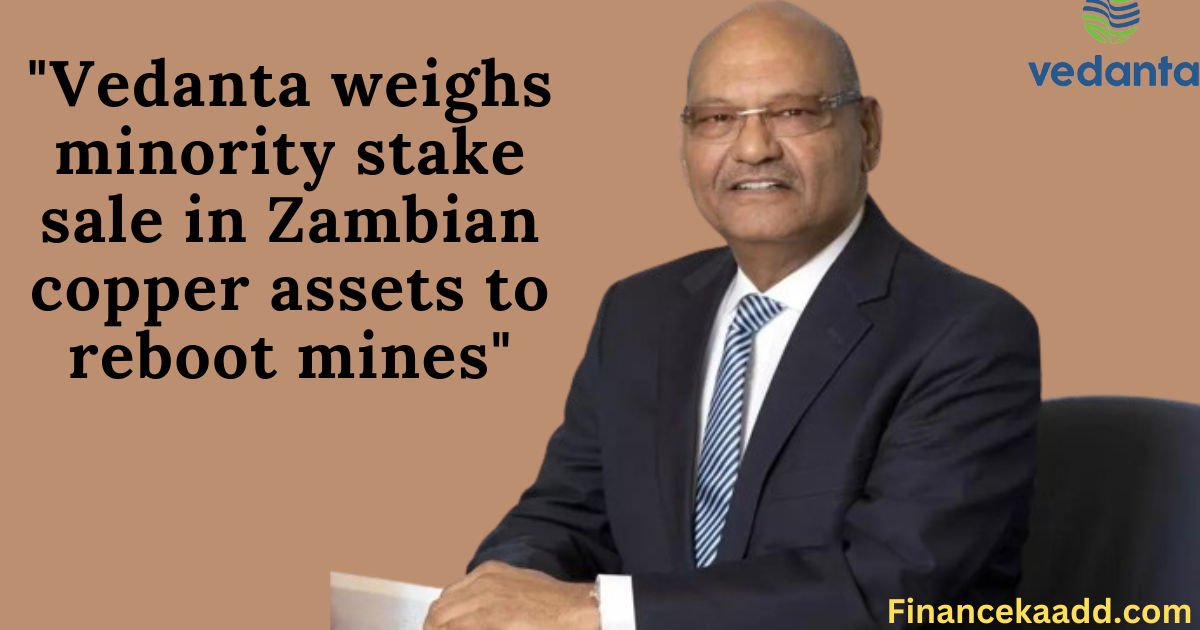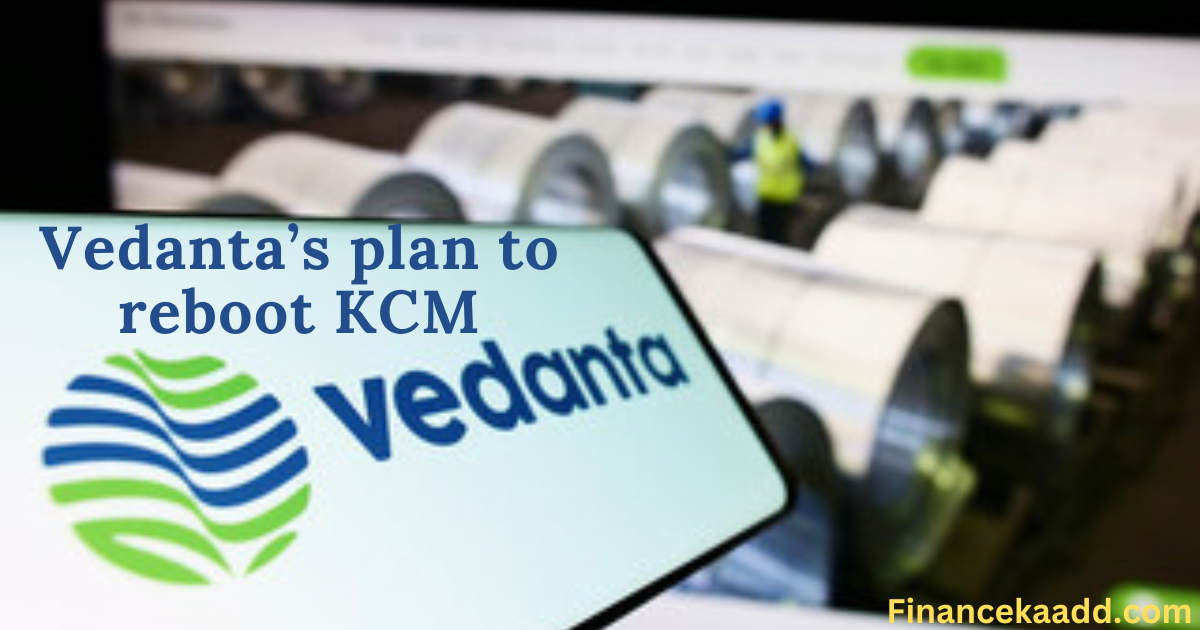Vedanta Resources, a global mining conglomerate, is considering selling a minority stake in its Zambian copper assets to raise funds for restarting its Konkola Copper Mines (KCM) unit, which has been underperforming for years. The company is in talks with various financing partners, including potential equity investors, to secure $1.3 billion for the revival of KCM, which has been mired in legal disputes and operational challenges.
Background of Vedanta and KCM
Vedanta is one of the world’s largest diversified natural resources companies, with interests in zinc, lead, silver, copper, iron ore, aluminium, power, and oil and gas. The company operates in India, Africa, Australia, and other countries and has a market capitalization of about $14 billion. Vedanta is owned by Indian billionaire Anil Agarwal, who holds a 50.1% stake through his family trust, Volcan Investments.
KCM is Zambia’s largest integrated copper producer, with operations located on one of the highest-grade copper seams in the world at Nchanga, Konkola, Nkana, and Nampundwe. The company has reserves and resources of 16 million metric tons of contained copper and produces about 200,000 metric tons of copper cathode and 3,000 metric tons of cobalt metal annually. KCM also operates two modern hospitals and 14 satellite clinics, as well as several schools and community development projects, as part of its corporate social responsibility program.
Vedanta acquired a 79.4% stake in KCM in 2004 from Anglo American, which had bought the assets from the Zambian government in 2002. The remaining 20.6% stake is held by the state-owned ZCCM Investment Holdings (ZCCM-IH). Vedanta has invested over $3 billion in KCM since 2004 and has pledged to spend another $1 billion over the next five years.
OPEN YOUR ACCOUNT, M,STOCK👉CLICK HERE
Challenges faced by Vedanta and KCM
However, Vedanta’s ownership and management of KCM have been fraught with difficulties, as the company has faced various legal, regulatory, environmental, social, and operational issues in Zambia. Some of the major challenges include:
- Tax disputes: Vedanta has been accused of tax evasion and underpaying royalties by the Zambian authorities, who have slapped the company with several audits and assessments. In 2014, the Zambian government increased the royalty rate for copper from 6% to 20%, which Vedanta challenged in court. In 2017, the Zambian Revenue Authority (ZRA) claimed that KCM owed $139 million in unpaid taxes and penalties, which Vedanta disputed. In 2019, the ZRA seized KCM’s bank accounts and demanded $180 million in additional taxes.
- Environmental violations: Vedanta has been sued by thousands of Zambian villagers for allegedly polluting their water sources and causing health problems. In 2015, a UK court ruled that the villagers could sue Vedanta in London, as the parent company of KCM. In 2019, the UK Supreme Court upheld the ruling, allowing the case to proceed. Vedanta has denied any wrongdoing and said it would defend itself vigorously.
- Labor unrest: Vedanta has faced frequent strikes and protests by its workers and contractors, who have demanded higher wages and better working conditions. In 2013, one worker was killed and 11 others injured in a clash between KCM employees and the police. In 2015, Vedanta announced plans to lay off 2,000 workers at KCM, citing low copper prices and high production costs. The move was opposed by the Zambian government and the unions, who threatened to revoke KCM’s mining license. Vedanta later agreed to suspend the layoffs and negotiate with the stakeholders.
- Operational inefficiencies: Vedanta has struggled to achieve its production targets and reduce its costs at KCM due to ageing infrastructure, declining ore grades, power shortages, and technical issues. The company has also faced delays and cost overruns in its expansion projects, such as the Konkola Deep Mining Project (KDMP), which aims to access deeper and richer ore bodies. The KDMP, which was launched in 2006, was expected to be completed by 2011, but is still ongoing and has cost over $1.5 billion so far.
Vedanta’s plan to reboot KCM
In May 2019, the Zambian government escalated its conflict with Vedanta by appointing a provisional liquidator to take over KCM and initiate its winding up. The government accused Vedanta of breaching the terms of its mining license, failing to pay taxes, and neglecting its social and environmental obligations. Vedanta challenged the move in court and claimed that it was not given a chance to defend itself. The company also alleged that the government was trying to sell KCM to a Chinese buyer without its consent.
The legal battle lasted for over a year, during which KCM’s operations deteriorated further as the liquidator cut jobs, halted projects, and reduced output. In September 2020, the Zambian government agreed to return control of KCM to Vedanta after reaching a settlement with the company. The settlement terms included:
- Vedanta retains a majority stake and operational control in KCM, while the Zambian government retains its 20% stake through ZCCM-IH.
- Vedanta is committing to invest $1 billion in KCM over the next five years to upgrade its facilities, increase its production, and improve its profitability.
- Vedanta is paying $20 million to ZCCM-IH as part of the settlement and agreeing to share the profits from KCM with the Zambian government on a 50-50 basis after meeting certain thresholds.
- Vedanta is withdrawing all legal claims against the Zambian government, and the government is dropping all charges and investigations against Vedanta and KCM.
Vedanta appointed Chris Griffith, a South African mining veteran, as the CEO of its base metals unit, which includes KCM, in 2020. Griffith, who previously led Anglo American Platinum, has been tasked with reviving KCM and restoring its reputation in Zambia. Griffith said that he has a plan to turn around KCM and that he is confident that the company can achieve its potential.
However, Griffith also said that Vedanta needs to raise $1.3 billion to restart KCM, as the company is heavily indebted and loss-making. He said that Vedanta is in the fundraising process and is exploring various options, including selling a minority stake in KCM to a strategic partner. He said that Vedanta will remain the majority shareholder in KCM and that any equity sale will be subject to the approval of the Zambian government and ZCCM-IH.
Griffith said that Vedanta is talking to a range of financing partners, including banks, private equity firms, and other mining companies, to raise the required funds. He said that the financing could be raised in stages and that much would depend on the structure of the deal. He said that Vedanta is looking for a partner who can bring not only capital but also technical expertise, operational experience, and market access to help KCM grow and prosper.
Griffith said that Vedanta’s plan for KCM involves increasing its copper output from the current level of about 90,000 metric tons per year to about 200,000 metric tons per year by improving its efficiency, reliability, and productivity. He said that Vedanta will focus on completing the KDMP, which will extend the life of the Konkola mine by 25 years and increase its production capacity from 2 million metric tons per year to 7.5 million metric tons per year. He said that Vedanta will also invest in upgrading the Nchanga smelter and refinery and in developing new projects, such as the Nchanga Tailings Leach Plant and the Nampundwe Pyrite Mine.
OPEN YOUR ACCOUNT PAYTM,MONEY👉CLICK HERE
Griffith said that Vedanta’s plan for KCM will create value for all the stakeholders, including the Zambian government, ZCCM-IH, the employees, the contractors, the suppliers, and the communities. He said that Vedanta will pay its fair share of taxes and royalties and will comply with all environmental and social standards. He said that Vedanta will also continue to support the health, education, and livelihood initiatives that KCM has been running for the benefit of the Zambian people.
Conclusion
Vedanta’s decision to sell a minority stake in its Zambian copper assets is a strategic move to raise funds for rebooting its KCM unit, which has been underperforming for years. The company is looking for a partner who can help it revive KCM and unlock its potential while maintaining its majority ownership and operational control. Vedanta has a plan to increase KCM’s production and profitability and to create value for all the stakeholders, including the Zambian government and the Zambian people. Vedanta’s plan for KCM is a positive sign for the Zambian copper industry, which is vital for the country’s economy and development.
Follow the Financekaadd.com channel on WhatsApp:👉Join Now
FAQs
Q: What are Vedanta resources?
Ans. Vedanta Resources is a global mining conglomerate with interests in zinc, lead, silver, copper, iron ore, aluminium, power, and oil and gas. The company operates in India, Africa, Australia, and other countries and has a market capitalization of about $14 billion.
Q: What is Konkola Copper Mines (KCM)?
Ans. KCM is Zambia’s largest integrated copper producer, with operations located on one of the highest-grade copper seams in the world at Nchanga, Konkola, Nkana, and Nampundwe. The company has reserves and resources of 16 million metric tons of contained copper and produces about 200,000 metric tons of copper cathode and 3,000 metric tons of cobalt metal annually.
Q: Why is Vedanta considering selling a minority stake in its Zambian copper assets?
Ans. Vedanta is considering selling a minority stake in its Zambian copper assets to raise funds for restarting its KCM unit, which has been underperforming for years. The company is in talks with various financing partners, including potential equity investors, to secure $1.3 billion for the revival of KCM, which has been mired in legal disputes and operational challenges.
Q: Who are the potential buyers of Vedanta’s Zambian copper assets?
Ans. Vedanta is talking to a range of financing partners, including banks, private equity firms, and other mining companies, to raise the required funds. The company is looking for a partner who can bring not only capital but also technical expertise, operational experience, and market access to help KCM grow and prosper.
Q: How much stake will Vedanta retain in KCM after the sale?
Ans. Vedanta will remain the majority shareholder in KCM and will retain operational control. The company will sell only a minority stake in KCM to a strategic partner, subject to the approval of the Zambian government and ZCCM-IH, the state-owned entity that holds a 20% stake in KCM.
Q: What is Vedanta’s plan to reboot KCM?
Ans. Vedanta’s plan to reboot KCM involves increasing its copper output from the current level of about 90,000 metric tons per year to about 200,000 metric tons per year by improving its efficiency, reliability, and productivity. The company will focus on completing the Konkola Deep Mining Project (KDMP), which will extend the life of the Konkola mine by 25 years and increase its production capacity from 2 million metric tons per year to 7.5 million metric tons per year. The company will also invest in upgrading the Nchanga smelter and refinery and in developing new projects, such as the Nchanga Tailings Leach Plant and the Nampundwe Pyrite Mine.
Q: What are the benefits of Vedanta’s plan for KCM for the stakeholders?
Ans. Vedanta’s plan for KCM will create value for all the stakeholders, including the Zambian government, ZCCM-IH, the employees, the contractors, the suppliers, and the communities. The company will pay its fair share of taxes and royalties and will comply with all environmental and social standards. The company will also continue to support the health, education, and livelihood initiatives that KCM has been running for the benefit of the Zambian people.

